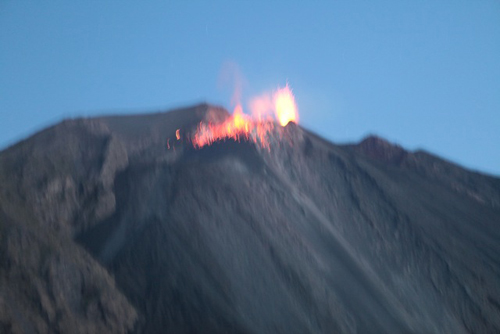People of Lavapolis
Lavapolis, an island as large as Malta, deeper than any other island in the Mediterranean rift between the coast of Crete, Sicily and the Libyan coast, has been inhabited and visited by people who expose themselves deliberately a social experiment. Some of them speak here about their experience for the first time. Friday, who is going to travel European cities during this spring, is one of them.
FRIDAY, illegal immigrant to the island with blur national identity, member of an activist group
We discovered each other on the Internet. At some stage, a few people decided to come to the island – illegally, of course, and temporarily. Presumably we are now illegal and temporary everywhere.
I was the first to arrive here. I know my way around the region quite well. As a teenager I spent some time in Bari, Italy. Europe looks like an alien planet from Bari. The Germans or Dutch have long since written off the south of the continent. No productive energy, insane unemployment levels, low educational achievements, corruption and the social Pre-Modern period. The entire Mediterranean area is a camp for globalization losers.
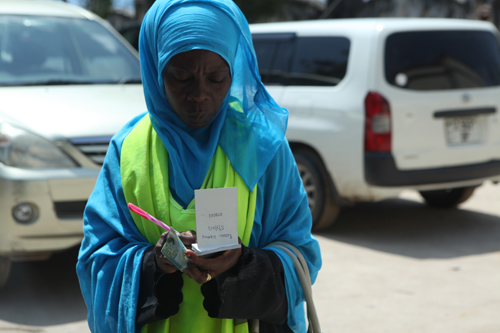
PADMA, 39, has lived on the island for many years, of Indian descent, the mother of two sons, a head of department in the government’s Social Fund
My dear mother gave birth to me in Aluva, Kerala. I have two brothers and two sisters who live with their families quite close to our parents and we respect them very much. I was the only one to move out. Aluva is now a suburb of the capital Kochi. It is very famous in India because of the temple where the poison Halahala has been stored. The poison had risen from the sea in the form of mist so that neither the Devas nor the Asuras could drink the Amrit. Amrit is the nectar of eternal life. The Devas and Asuras died. But then Shiva drank the poison and took it in his mouth to Aluva. That is why we say: if anybody wants to drink Amrit, they must first swallow the poison.
Our people really swallow a lot of poison. And rarely obtain any nectar… My parents love their children above anything else and made sure that we received a good education. Of course they were proud of my promotion to Kochi. When I received the offer to come to the island for the bank three years later, they were rather worried about me. Everyone in Kerala knows that it is best for young people to look for their sip of Amrit somewhere else. They had heard very little about the island at that time. They would have preferred to see me in Bombay or the Gulf. My dear mother gave birth to me in Aluva, Kerala. I have two brothers and two sisters who live with their families quite close to our parents and we respect them very much. I was the only one to move out. Aluva is now a suburb of the capital Kochi. It is very famous in India because of the temple where the poison Halahala has been stored. The poison had risen from the sea in the form of mist so that neither the Devas nor the Asuras could drink the Amrit. Amrit is the nectar of eternal life. The Devas and Asuras died. But then Shiva drank the poison and took it in his mouth to Aluva. That is why we say: if anybody wants to drink Amrit, they must first swallow the poison.
FRIDAY
I sometimes spent my summer holidays in this camp. It was a bit weird. Laptops, for example, had not yet found their way to Apulia. People only knew about the Internet from hearsay. We only met locals at the beach at weekends, but then there were droves of them making a lot of noise. Many could not even swim. Because hardly anyone spoke English, I had to speak Italian. For me that was quite an achievement.
When I was a few years older, I sometimes took the ferry to Patra with friends and I hitchhiked through Albania and Greece. We even visited the island once. Someone told us about the casinos and the huge airport. I found it all pretty bizarre in comparison to the little snow-white villages on the other islands and the tramps in Bari. Despite this, an idea had taken root in me to return and see what had happened to the casinos and the airport.
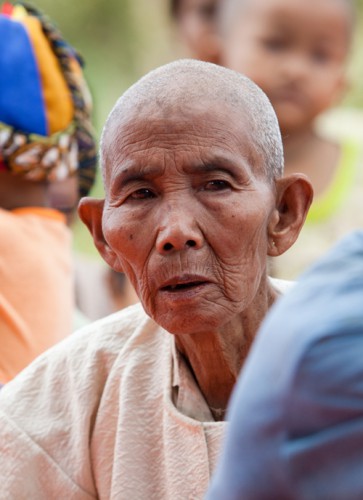
ALBERTO, 56, a native of the island, director of the Department of Strategic Planning in the Faidon Messinis government
All the residents of the island are equipped with video-pods. Our citizens are able to become involved in the Agora through this instrument. They can contact any citizen via the video-pod from any terminal at the Agora. If he or she accepts the enquiry, they automatically accept that the contact will be stored in the archives at the Agora…
Each person is involved in expanding the human collection. This turns it into an artwork. If you like, we potentially have six hundred curators, who are managing and enriching a collection of six hundred thousand human subjects. No more and no less. Compared to the normal social media, it’s a village…
Do you realise artists, curators, the public… There’s no difference for us anymore. Everyone’s an artist, a curator or the general public. Each person tells their story and it is also the subject of history. We have nothing against professional art. It has its place in our archives too. Its creators belong to the community of the Agora like any others. But that’s all. We don’t share the conviction that artists might have more important things to say about us than others – than we do, for example. They have one voice, but it’s the voice of an individual. What counts for us is the collective body, the citizens, their stories, their objects. – We’ve reached one of the most important functions of the universal Agora. It liberates individuals from the obligation to either be a producer or consumer for professional, material, religious or other reasons. It destroys the contradiction between art and life. What you can see here is the island, both as fiction and as reality…!
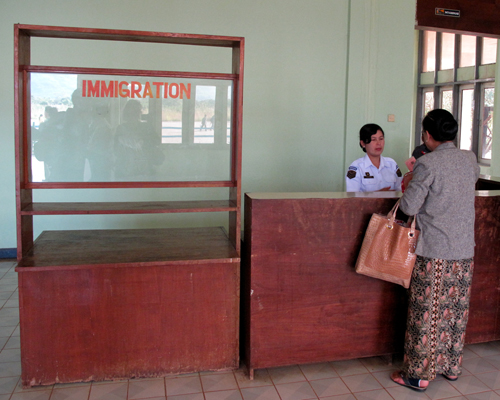
DASHA, 43, a resident of the island for five years, of Russian-Jewish descent, the mother of a 14-year-old son, works at the immigration department
They call me Strelka in the office. I zipped around during my first few months as if I had lost my purse. But I just wanted to organise our new life as quickly as possible. My boss asked me at some stage what arrow means in Russia. “Well, Strelka,” I replied. That gave me my nickname – because I shot through the office like an arrow…
I calmed down in due course. But I kept my nickname without anybody thinking much about it – apart from me. The bitch that was sent into space a long time ago for experimental purposes in the Soviet Union, which was my home, was also called Strelka. It was not the first dog in space, but the first one to return alive. Perhaps Strelka survived because it did not fly alone. There was a second dog, Belka, in the metal capsule, the sputnik. There was also a rabbit and some mice, rats and who knows what else. This sputnik was a real Strelka ark…
Perhaps that matches my nickname and I really am an experimental dog. But I have shot myself deliberately up into space. The first expedition was to Israel, the second to Austria, the third here.
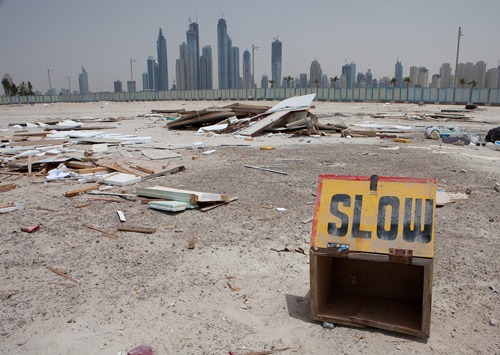
FRIDAY
No one believed in a future any more. That was a disease and a plague. You might say we have found protection from this disease on the island. Some commute to the mainland, others have their home on the island. Every now and then we return to the cities that we left for some kind of project. But we mostly operate on the Internet.
STASCHA, 41, an island resident for a short time, a Briton of Macedonian descent, a journalist
I was ready to get away from it all. I boarded a plane belonging to an airline that is so successful with its price dumping and landed in a paradise, not one hundred and ninety nautical miles west of Greek territorial waters. I wanted to know.
So here I am: I am still a bit shaky on my legs due to the notoriously narrow rows of seats, still slightly irritated by the glistening sunlight that matches the adverts. But thinking processes cannot be repressed or corrupted. My critical faculty, which makes me who I am, is returning.
It occurs to me that while thousands of people are queuing up in front of soup kitchens over there in Athens and Heraklion, people are competing for every available job holding banners and children are unable to go to school because they are so hungry, here, international colonies of high-end tourists are wandering through the golden sands of Leisure City, kept fit by Moët & Chandon refreshments and Thai massages before heading out on a rented yacht for a cruise through the still sun-drenched archipelagos of southern European economic misery or returning for a casual game of baccarat at the hotel’s casino… Something sticks in my throat.

FAIDON, 69, the current prince on the island, in conversation with STASCHA
F OK… I’ll give you a riddle! A farmer leaves behind seventeen horses and a will after he dies; he assigns his inheritance to his three sons according to the following ratio: the first son receives half, the second a third and the youngest a ninth of the horses. Now find the solution!
S I assume this is a trick.
F Then you’re doing the dead man an injustice. We both know that you can’t divide seventeen horses into halves or thirds without causing a bloodbath. But look, the people in the countryside talk to each other about their problems. So the three brothers seek help from a neighbour. The neighbour finally has an idea. He lends the brothers one of his horses so that they now have eighteen. The ratio now works perfectly: the oldest receives nine, the middle son six and the Benjamin three of the animals. And to increase the miracle, the horse that the neighbour has lent them is left over.
S Back to the people on your island.
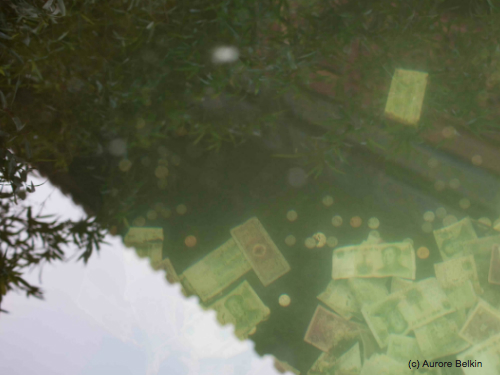
F I am with them, Stascha. I fear lest the outside world acts like you – and cannot solve the riddle. Instead of lending one horse, the inheritance is gradually being slaughtered. Woe if the transaction does not pay off! Well, the transaction is not particularly beneficial for the neighbour. He doesn’t lose anything, but gains little too. So why does he help? Because he’s a neighbour and neighbours in the countryside generally help each other. We may not be in the countryside, but we’re establishing an unprofitable economic zone with a great deal of economic expertise. We’re lending people, who have a project, horses so that they can complete their project. If all goes well, we’ll get our horse back. You’re familiar with the unprofitable economic zone known as the Social Fund. The outside world has abandoned any faith in the need for these kinds of zones. But that’s precisely our opportunity. The society that we have in mind is not more profitable, but simply more humane than others. We spend a lot of money on art and culture, on international aid projects, on young people who have amazing ideas, and we don’t ask questions about the profits that we might obtain. We enable the quality of life, which has now become unimaginable in your home country, in a social world.
DIAMANTIS, one of the first to colonise the island, formerly a key figure in setting up the economy under the original prince, Theodore Messinis
Perhaps you have some idea of where I am heading. I am now 103 years old. Some of my friends still come to play dominos. Iosif is even two years older than me. I am not amazed by anything anymore… I have simply forgotten to die.
